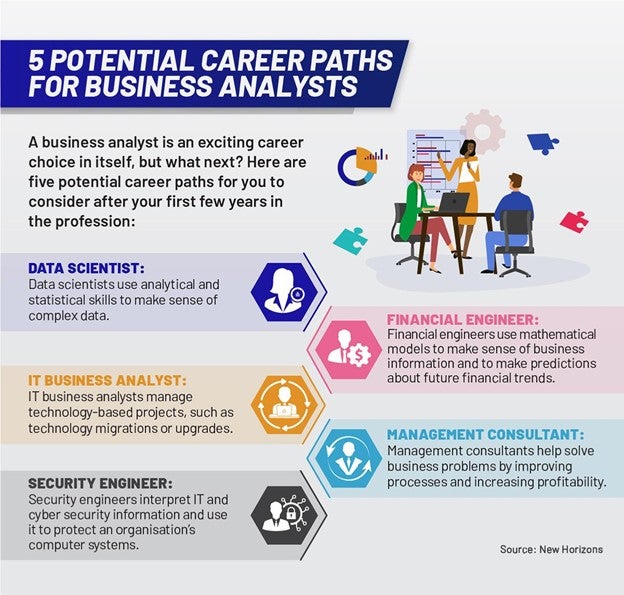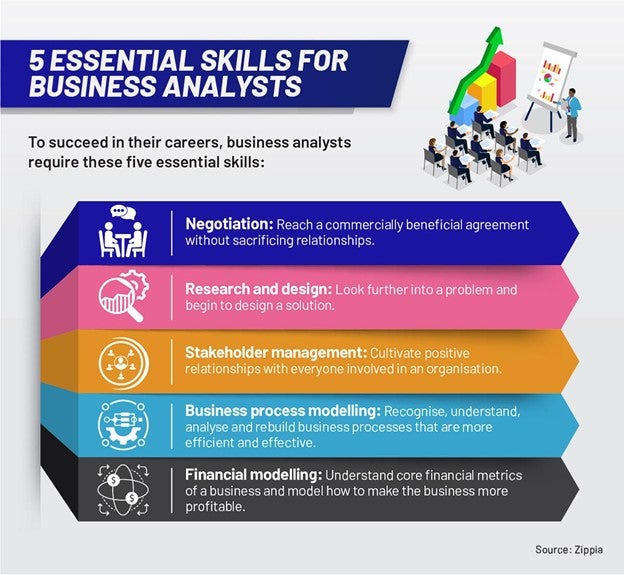In the business sector, few careers are as interesting and diverse as that of a business analyst. A business analyst, or someone who analyses and creates solutions for the market, processes, or systems in business, is a fast-growing career in Australia.
In fact, a survey conducted by Onya Magazine predicted that the number of business analyst jobs will increase to 26,100 by 2023.
Becoming a business analyst is not only an interesting career with great prospects but also rewarding, with the average entry-level pay, according to Talent.com, starting at AUD$99,144.
To succeed as a business analyst, you need to understand the profession, the available career paths, and the required business analyst skills.
What is a Business Analyst?
When most people hear the term “analyst,” they think of a highly technical role; however, one of the most crucial business analyst skills is the ability to facilitate successful business change.
A business analyst helps to define business problems via in-depth research, which can be either technical or non-technical, and then strategises to create solutions that drive positive business change. Business analysts are often required to outline detailed requirements for a solution and ensure that the proposed solution can meet business requirements. Typically, companies use business analysts in information technology (IT) or business transformation projects.
Managing change is a vital business analyst skill because business analysts are often engaged from the very beginning of any project. They advise senior employees in the business, including executives. They help bridge the gap between multiple stakeholders in business, including IT and human resources (HR).
Business analysts may have many varied responsibilities, depending on the type of organisation or industry they work in. Typically, a business analyst is expected to perform the following tasks:
- Researching, validating and recording business requirements
- Analysing technical and nontechnical data, including financial information, such as budgets and sales results
- Using different models to analyse business processes
- Researching and identifying potential process improvements
- Risk management, including exploring the risks and benefits of solutions and their resulting business impact
- Creating documentation, including functional specifications, for any solutions proposed
- Estimating costs, savings and business benefits of solutions proposed
- Communicating effectively, including simplifying technical jargon and translating it into meaningful reports
- Creating, implementing and testing solutions
- Supporting transformations and change
Because business analysts perform a wide variety of tasks in a business, a wide range of business analyst skills are required.
Business analyst career paths, education requirements and salaries
One of the many benefits of becoming a business analyst is the number of different career paths you can take. The reason for this variety is that the business analyst skills you acquire equip you to succeed in both business and technical roles.
Here are five potential career paths for a business analyst, as well as the education requirements and potential salaries for those paths:
1. Management Consultant
Management consultants provide strategic advice on an organisation’s finances, operations, and processes. They often provide specialist skills that people within an organisation may lack, and they are known for their big-picture thinking and ability to solve complex problems.
The management consultant role requires being exceptional at data gathering and analysis, and equally exceptional at developing solutions and communicating those solutions. Management consultants don’t always work on technical problems, so business analysts who choose this career path must be well versed in all areas of business, from finance to people-related issues. Management consultants can go on to many senior roles in organisations, including management and executive positions.
Education requirements
A business qualification, for example, an MBA, is generally recommended for business analysts wanting to pursue this path.
Salary
According to Indeed, the average annual salary for management consultants in Australia is AUD$107,426.
2. IT Business Analyst
An IT business analyst is responsible for bridging the gap between IT and the business. To do this, IT business analysts use data to make sense of business problems, determine requirements, and ultimately deliver data-driven solutions. They work collaboratively with business stakeholders to provide solutions that solve business problems.
The IT business analyst role requires exceptional technical skills. Business analysts who choose this career path can move up to senior positions, including head of IT or even chief information officer (CIO).
Education requirements
A technical qualification, such as a Bachelor of Information Systems (BIS), is required to become an IT business analyst. A business qualification is also beneficial.
Salary
The average annual salary for IT business analysts in Australia is AUD$81,728, according to PayScale.
3. Data Scientist
A potential career path for business analysts is data scientist. Data scientists use many business analyst skills, including gathering and extracting meaning from data, producing meaningful information for business decisions.
The data scientist role is technical, suiting business analysts who enjoy working with statistics and technology. Data science as a profession is experiencing incredible growth, with several senior roles available, including head of data science and analytics.
Education requirements
Data scientists often need a technical degree, for example, a Bachelor of Data Science (BDS). Business qualifications, for example, a Master of Business Administration (MBA), can also be helpful in senior roles.
Salary
According to Indeed, the average annual salary for data scientists in Australia is AUD$92,357.
4. Financial Engineer
A financial engineer tests and issues financial tools and conducts the financial analysis required to test those tools. Financial engineers work predominantly in derivatives trading and in other speculative financial markets. They use mathematical models and other forms of analysis to make predictions about financial transactions.
The financial engineer role is technical, suiting business analysts who enjoy working with mathematical modelling and managing risk. Many senior roles are available in this area, including executive roles in risk management and financial advisory services.
Education requirements
To become a financial engineer, a business qualification in finance is often required.
Salary
According to Indeed, the average annual salary for financial engineers (also known as financial analysts) in Australia is AUD$98,766.
5. Security Engineer
As a security engineer, a business analyst can expect to analyse systems and risks in those systems. Security engineers regularly identify vulnerabilities, create systems, and enhance security features to ensure that these systems function effectively. They’re constantly enhancing the security of the IT infrastructure of their organisations.
This particular career area is well suited to technical business analysts who enjoy working with software, hardware and technology. This type of role involves less consulting and more time spent analysing systems and technology to ensure that they’re working effectively. Senior roles associated with this career path include head of security, as well as senior management roles in IT.
Education requirements
A technical qualification, for example, a Bachelor of Information Systems, is often required to succeed in this area.
Salary
The average annual salary for security engineers in Australia is AUD$118,862, according to Indeed.

15 Business Analyst Skills
Throughout their careers, business analysts require many different skills to succeed. The breadth of business analyst skills required can feel overwhelming. However, the following are of primary importance:
1. Negotiation
An essential business analyst skill is negotiation. Negotiation skills involve the ability to communicate effectively to reach a compromise in which all parties benefit.
Business analysts may need to use negotiation skills when designing solutions to business problems, especially when certain stakeholders or departments don’t see a benefit in a particular solution.
To develop better negotiation skills, business analysts should have a realistic goal before negotiations, plan ahead and practise their listening skills and empathy.
2. Sound Decision-Making
Sound decision-making is another essential skill for business analysts. It involves thinking through a list of alternatives and selecting the best possible one, based on the situation at hand.
Business analysts need to use this skill every day. They need to decide what data to use and what data to ignore. They need to decide what solution to propose and why that particular solution is the best fit for the situation. They also need to regularly assess risks and benefits.
To develop sound decision-making skills, business analysts should develop lists of pros and cons, consult experts, set deadlines and always plan ahead.
3. Exceptional Communication
Business analysts regularly need to communicate with stakeholders from multiple departments in organisations, and they may also need to communicate with senior management. For this reason, exceptional communication skills — the ability to effectively discuss in person and in writing — is critical for business analysts.
Business analysts can develop this vital skill in many different ways. Methods include practising better listening, learning to observe body language, striving to be concise, writing things down and critically thinking before communicating.
4. Problem-Solving
The job of any business analyst is essentially to problem-solve. For this reason, problem-solving is a critical business analyst skill.
Problem-solving — the ability to define a problem, determine its cause and identify, prioritise and select alternatives for a solution (and then implement this solution) — is a skill that business analysts will have to use on every single project they work on.
Business analysts can improve this skill by clearly defining the problem, creating a process for solving it, actively listening and focusing on the solution.
5. Leadership
Business analysts naturally need to be leaders, as they need to work with people to engineer an outcome.
Leadership skills — the ability to guide, motivate, and influence others toward achieving goals — is essential for business analysts, especially regarding gathering requirements from different stakeholders and creating solutions that solve business problems.
Business analysts can enhance their leadership skills by taking a professional course on leadership, as well as finding a mentor.
6. Technology
Technology skills are essential in just about every business analyst job, and for that reason, the ability to understand, quickly master and manipulate technology is a crucial business analyst skill.
To improve this skill, business analysts should regularly use as many tools as possible, both at work and outside it, to increase their efficiency with technology. They should endeavour to experiment while using technology and problem-solve with it as much as possible. Reading user manuals and visiting user forums can also be beneficial.
7. Project Management
Project management is a critical business analyst skill, as business analysts tend to continuously work on different projects to help solve business problems. Good project management skills involve planning projects, including creating timelines and deadlines, managing a budget, and managing the various resources required to run a given project.
For any business problem, a business analyst needs to adhere to potentially strict deadlines and may also have budgets associated with data collection and analysis. Being able to manage these moving parts is essential for all business analysts.
To improve this skill, business analysts need to prioritise tasks in the project schedule, use project management software, pay attention to deadlines and ensure that all project elements are effectively communicated.
8. Financial Analysis
Financial analysis is a key skill for most, if not all, business analyst jobs. The term “financial analysis” refers to the ability to interpret and understand fundamental financial data and use this data to strategically plan for the use of financial resources in an organisation.
As part of their role, business analysts will often work with financial information, as likely the outcome of their analysis will be to save (or make) the organisation money. They need to understand the cost drivers for the business and how to interpret key financial reports to ensure that their work results in the most profitable outcome.
The key to improving the skill of financial analysis is to learn by doing. Business analysts should strive to seek and use new tools, play around with data sets, and enrol in financial studies to further their knowledge.
9. Business Process Modelling
Business process modelling involves mapping out an organisation’s current business processes, so they can be analysed, improved and potentially automated. This type of modelling is something business analysts need to perform regularly to understand organisations and suggest solutions.
Many steps come into play during this process, so business analysts need to improve in a number of areas to improve this skill overall. To master the skill of business process modelling, business analysts need to practise detailing every step, mapping processes using specialist business process modelling software, and creating and suggesting different routes to success.
10. Stakeholder Management
Every aspect of a business analyst’s role involves interacting with stakeholders, so for this reason, stakeholder management is an essential business analyst skill. Effective stakeholder management involves the ability to communicate with and manage multiple individuals or departments so that they understand what’s happening and are satisfied with the outcome.
From understanding business requirements to collecting data to presenting solutions, business analysts will always find a use for stakeholder management skills.
Business analysts should create schedules for stakeholder communication to improve these skills, ensure that they’re consistent in their message and practise active listening.
11. Statistical Analysis
Statistical analysis involves collecting, organising, interpreting and presenting data. Data gathered will usually be analysed using a specific statistical or analytical model.
As part of their analysis process, business analysts will typically work with a large amount of data and be asked to make sense of it. For this reason, statistical analysis is a critical business analyst skill.
To improve this skill, both academic learning and practice are required. Business analysts should understand the basics of statistical analysis, which they can learn in courses or online. After this, performing small calculations by hand, checking assumptions and practising using software can also help.
12. Planning and Organising
Planning and organising is the ability to think ahead in terms of what’s required, and then create a plan and act accordingly. Specifically, effective planning and organising include arranging each task appropriately and completing them by the deadline. Problem-solving is an essential part of planning and organising.
With the myriad tasks required of a business analyst, effective planning and organising are key to ensuring that appropriate solutions are created.
To improve this skill, business analysts should systematically establish priorities, labelling tasks as urgent, important and unimportant. To-do lists can also be helpful with planning and organising.
13. Researching and Design
Researching and designing is the ability to gather information from various sources and then make sense of it. Design then refers to understanding different data and information and to designing a customer-centric solution based on that.
As part of the requirements gathering phase of business analysis, business analysts need to be extremely good at researching and designing solutions. Information required for an analysis won’t always be easily obtained, so business analysts need to understand how to extract data from various sources.
To improve these skills, business analysts need to ensure that they start broadly with their research, and then narrow the scope once they have the required information. They also need to learn how to recognise good versus bad data and limit searches when required.
14. Presentation
Business analysts may be able to develop the best possible solutions, but these aren’t valuable to the business unless they can be presented effectively. For this reason, presentation, including the ability to turn information into an easily accessible and understandable document and to communicate it verbally, is a critical business analyst skill.
Business analysts will need to present their solutions on every project they work on. They can improve this critical skill by demonstrating passion in their presentation, asking questions, preparing, and practising.
15. Requirements Gathering
The final critical skill for business analysts is requirements gathering. Requirements gathering is the practice of researching and discovering what’s required for users, stakeholders or customers.
Business analysts should ensure that they document requirements, communicate effectively with stakeholders, be transparent and practise active listening to improve this skill.
SCU Online’s MBA targets particular skills, such as leadership and project management, while giving you the opportunity to gain a cross-functional, versatile business skillset. Maximise the positive impacts you have within an organisation by diversifying your skillet.

Business analyst is a key job for the future
As organisations increasingly use more technology and become more dispersed with more people than ever working from home, business analysts will have new and exciting business problems to solve and even more career paths to embark on. This lucrative, fast-growing and diverse career offers much, as long as those interested in it arm themselves with the right set of business analyst skills.
Want to become a leader in business? When studying SCU Online’s MBA program, you will learn in-depth knowledge to enhance your business management expertise in today's competitive global market. Get in touch with a Student Enrolment Advisor today on 1300 863 819 to learn how you can diversify your skillset with an MBA.





